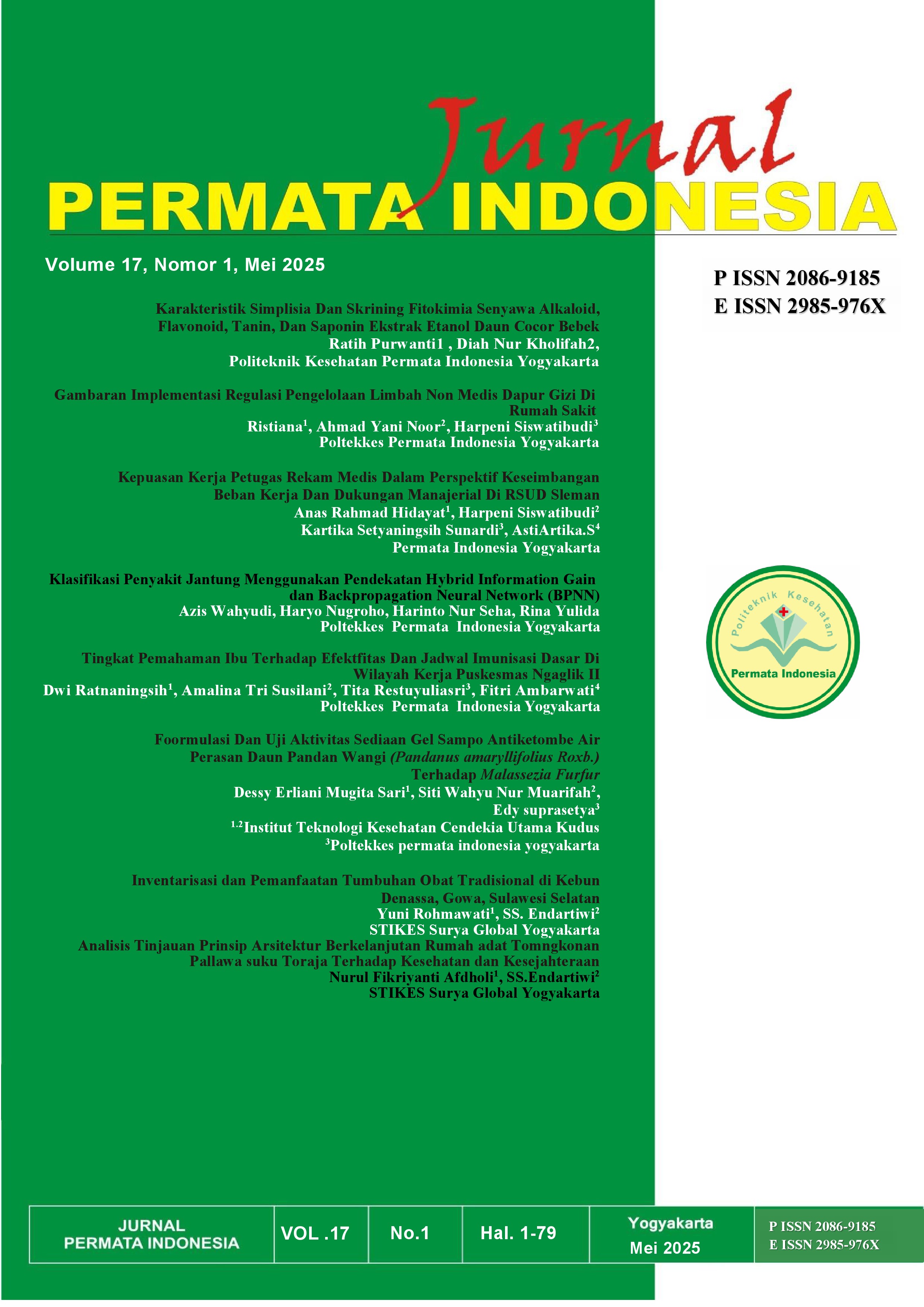Heart Disease Classification Using a Hybrid Approach of Information Gain and Backpropagation Neural Network (BPNN)
DOI:
https://doi.org/10.59737/jpi.v17i1.347Keywords:
Heart Disease, Information Gain, Backpropagation Neural Network, Hospital Management Information System, ClassificationAbstract
Heart disease is the leading cause of death worldwide. To detect the risk of heart disease early, an accurate and efficient classification method is needed. This study proposes a hybrid approach by combining Information Gain (IG) feature selection and the Backpropagation Neural Network (BPNN) classification algorithm. The dataset used is the Heart Disease Dataset from the UCI Repository, consisting of 303 patient records. Eight top features were selected using Information Gain. The BPNN model was trained using parameters hidden_layer_sizes=(16, 8), activation='relu', and learning_rate_init=0.01. A hidden layer with 16 and 8 neurons enables the network to learn complex patterns in the data. The ReLU (Rectified Linear Unit) activation function is used to speed up training convergence and avoid the vanishing gradient problem. The learning_rate_init=0.01 parameter controls the speed of weight updates during the learning process, affecting the model's stability and convergence. The evaluation results show that the model achieves 79.12% accuracy, 84.44% precision, 76.00% recall, 80.00% F1-Score, and 85.95% AUC. The 5-Fold Cross Validation yielded an average accuracy of 82.15%. These results indicate that the IG + BPNN hybrid approach provides good and stable classification performance in detecting heart disease.
Keywords: Heart Disease, Information Gain, Backpropagation Neural Network, Classification, Data Mining
References
World Health Organization (WHO). Cardiovascular diseases (CVDs) – Key facts. Geneva: WHO; 2021. [Online]. Tersedia di: https://www.who.int/news-room/fact-sheets/detail/cardiovascular-diseases-(cvds)
Deo, R. C. (2015). Machine Learning in Medicine. Circulation, 132(20), 1920–1930. https://doi.org/10.1161/CIRCULATIONAHA.115.001593
Alsharif, M. H., Alsharif, Y. H., & Kim, J. (2020). Artificial Intelligence–Based Heart Disease Prediction System Using Backpropagation Neural Network and Genetic Algorithm. Journal of Healthcare Engineering, 2020, Article ID 1406143. https://doi.org/10.1155/2020/1406143
Detrano, R. et al. (1989). International application of a new probability algorithm for the diagnosis of coronary artery disease. The American Journal of Cardiology, 64(5), 304–310. https://doi.org/10.1016/0002-9149(89)90524-9
Han, J., Kamber, M., & Pei, J. (2012). Data Mining: Concepts and Techniques (3rd ed.). San Francisco: Morgan Kaufmann.
Miao, Y., & Niu, X. (2016). A Survey on Feature Selection. Procedia Computer Science, 91, 919–926. https://doi.org/10.1016/j.procs.2016.07.258
Karthik, R., Menaka, R., & Priya, P. (2019). Heart Disease Prediction Using Backpropagation Neural Network and Feature Selection Technique. International Journal of Engineering and Advanced Technology (IJEAT), 8(5), 426–430.
Kaur, H., & Wasan, S. K. (2006). Empirical Study on Applications of Data Mining Techniques in Healthcare. Journal of Computer Science, 2(2), 194–200. https://doi.org/10.3844/jcssp.2006.194.200
Sitaula, C., & Aryal, S. (2018). Heart Disease Classification: A Deep Learning Approach. 2018 International Conference on Computing, Electronics & Communications Engineering (iCCECE), 219–224. https://doi.org/10.1109/iCCECE.2018.8658722
Setiawan, R., Nugroho, H. A., & Wicaksono, A. F. (2017). Feature Selection Using Information Gain for Heart Disease Classification. International Journal of Computer Applications, 170(8), 10–14. https://doi.org/10.5120/ijca2017914788
Iswanto, M. I. (2020). Klasifikasi Penyakit Jantung Menggunakan Metode Artificial Neural Network (ANN). Jurnal Teknologi Informasi dan Ilmu Komputer (JTIIK), 7(5), 987–993.
Srivastava, S., & Srivastava, A. (2020). Comparative Analysis of Machine Learning Algorithms for Heart Disease Prediction. Procedia Computer Science, 167, 1910–1917. https://doi.org/10.1016/j.procs.2020.03.210
Yuvaraj, N., & Yuvaraj, M. (2021). Heart Disease Diagnosis Using Hybrid Machine Learning Model. Materials Today: Proceedings, 45, 3702–3706. https://doi.org/10.1016/j.matpr.2021.01.122
Dey, N., Ashour, A. S., & Balas, V. E. (2018). Smart Medical Data Sensing and IoT Systems Design in Healthcare. Springer.
Zhang, Y., Wang, S., & Phillips, P. (2014). Binary PSO with mutation operator for feature selection using decision tree applied to spam detection. Knowledge-Based Systems, 64, 22–31. https://doi.org/10.1016/j.knosys.2014.03.005
Downloads
Published
How to Cite
Issue
Section
License
Copyright (c) 2025 Azis Wahyudi, Haryo Nugroho, Harinto Nur Seha, Rina Yulida

This work is licensed under a Creative Commons Attribution 4.0 International License.












